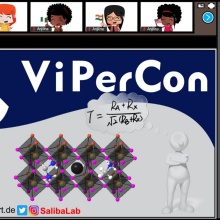Prof. Michael Saliba from the Institute for Photovoltaics took up the challenge of an online scientific conference when organizing the ViPerCon2020. In a guest article in Nature Energy, and here in the interview, he tells us how the conference went and explains what is important.
What kind of conference was the ViPerCon2020?
Michael Saliba: At the ViPerCon2020 (Virtual Perovskite Conference 2020), research results on perovskites were presented. Perovskites are a new class of semiconductors which are expected, among other things, to lead to more efficient solar cells. The one-day online conference was scheduled because this year the spring meeting of the Materials Research Society had to be canceled due to corona restrictions. The experiment attracted 680 participants, far more than we had expected.
What do you have to keep in mind when organizing a conference like this?
MS: Organizing an online conference is, first of all, less complex and also less expensive than organizing a physical meeting. You don’t need a function room, there is no complicated travel planning, no catering, and no evening events. Therefore the preparation can be done with a smaller team and in less time. We only had four weeks to prepare the ViPerCon2020, advertising was exclusively in the social media.
However, other aspects must be taken into account:
- It is important to choose a suitable conference software, for example Zoom, WebEx, Microsoft Teams, Jitsi, and others. The tools differ in terms of functionality, cost, reliability, and the possible number of participants. The participants’ familiarity with a particular system must also be taken into account.
- Before the start of the conference, it is necessary to inform the participants in good time about technical requirements such as loudspeakers, fast internet, headset, and webcam.
- The course of the conference needs a clear structure that also allows the audience to ask questions. This is a challenge, especially at large conferences. Here, written questions can be used, for example in a moderated online chat. Non-verbal cues such as applause can be communicated by means of pictograms or emoticons.
- The schedule and the length of the conference are very important. At the ViPerCon2020 we had four slots on one day, each lasted 90 minutes and was followed by a 15-minute break. During the breaks the participants can refresh themselves, move around, and refocus. You need this because staring at the screen and at yourself for too long tires you out.
What are the advantages of online conferences?
MS: For many researchers, only online conferences make it possible to participate in scientific exchange to this extent. Just think of young scientists from countries such as China, India, Latin America, and even Europe, who don’t have the means for expensive trips abroad and conference fees or don’t get a visa. Participation is also made easier for researchers with family obligations - mostly women - as well as for people with a disability or health problems. All in all, online conferences enlarge the circle of potential participants and speakers. They are also more open and dynamic. Young researchers are more likely to make themselves heard in the anonymity of the web. This counteracts the (often involuntary) tendency at offline conferences that mainly the established scientists get attention. All this increases the quality of a conference and fosters the “community spirit”. Last but not least, digital events reduce CO2 emissions caused by aviation - an aspect that should not be neglected, especially in our field of energy research.
And where are the limits?
MS: Conferences are more than just discussions, they connect the scientific community. These informal talks mainly take place during coffee breaks, at meals, or during the social program. The poster sessions are important for young scientists, enabling them to increase their visibility and establish contacts with future employers. These aspects are difficult to represent online. However, the shortcoming can be mitigated, for example, by means of virtual “side rooms” for three to five participants, or a virtual reality environment.
Would you hold such a conference online again, once corona is over?
MS: Absolutely! For many of us, corona was a real eye-opener to realize that it’s not necessary to be personally present at every conference. While not every aspect of an offline conference may be represented online, online conferences have several advantages and, therefore, I’m confident that they will become firmly established in the future.
Prof. Saliba, thank you very much for the interview!
IFAC World Congress 2020 was also held online
The World Congress of the International Federation of Automatic Control (IFAC), which should have taken place in Berlin this year, was also held as an online conference. For the past three years, Prof. Frank Allgöwer, Head of the Institute for Systems Theory and Automatic Control at the University of Stuttgart, has been the President of IFAC. In this capacity and together with 50 other members, he was responsible for preparing the congress. The online conference comprised around 5,000 participants and 3,000 presentations in almost 500 sessions, including topics such as corona, Industry 4.0, robotics, and artificial intelligence.





